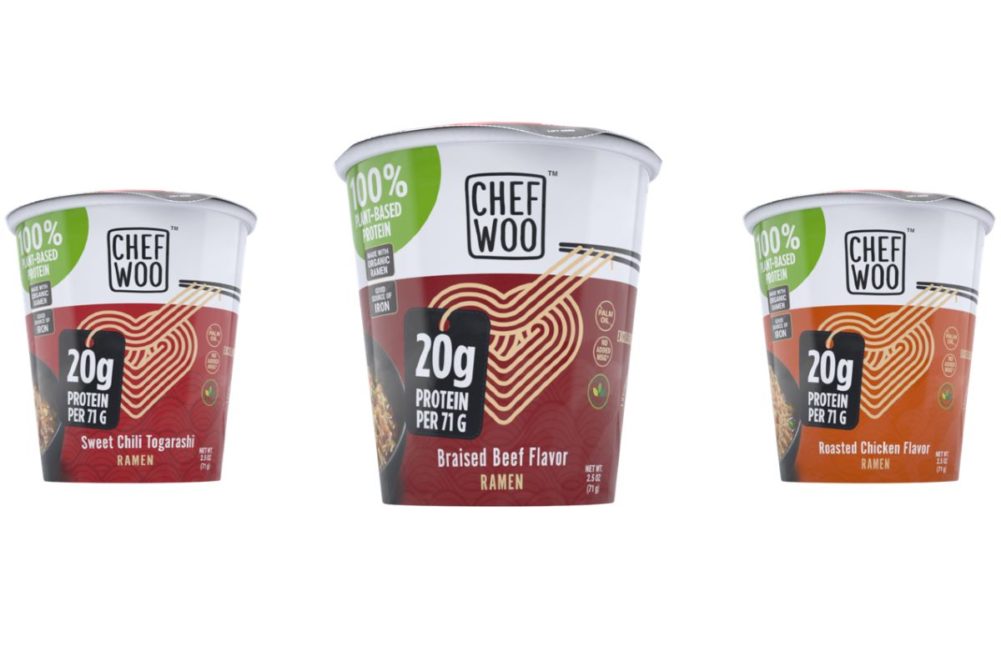OAKVILLE, ONT. — After witnessing the dangers of malnutrition firsthand in the medical field, Reza Soltanzadeh, MD, is aiming to supply affordable, nutritious and sustainable meal solutions to consumers facing dietary deficiencies.
To support his mission, he co-founded Borealis Foods in 2019 alongside Barthélemy Helg. The Ontario-based food technology company is focused on providing adequate protein for consumers who would not otherwise have reliable access to protein sources.
“We make food that is geared toward people who need it most,” Soltanzadeh said in an interview with Food Business News. “If we’ve got protein malnutrition, we’re going to have major, major issues with human immunity. That will cause pandemics, as we saw, and cause disease in communities that will not be able to be controlled.”
Borealis saw potential in the instant noodle format due to the convenience and shelf-stability benefits that come with the more than $40 billion global segment. The company developed its high-protein, plant-based formulation under the Chef Woo brand utilizing a blend of pea protein, high-oleic sunflower oil, wheat flour and a variety of other legumes and grains. Soltanzadeh explained how it was challenging to find the right sources of all nine amino acids necessary for a complete protein product while balancing texture and taste profiles.
“We did not want to use only pea protein because we would not be able to make it taste good, because when you have only pea protein you have a particular kind of palatability, which is not a noodle,” he said. “So, we had to find the protein, make sure we can source all the amino acids in it, make sure that the dough is soft enough and elastic enough to be able to stretch, and stable enough so that we could turn it into a noodle and make sure that it has a one-year shelf life.”
Borealis officially launched Chef Woo ramen in 2020, offering 20 grams of protein (equivalent to 40% of the recommended daily value of protein) at 330 calories per serving. The noodles are manufactured in the South Carolina facility of its US-based subsidiary Palmetto Gourmet Foods. The site’s advanced production lines and scale capacity have allowed Borealis to retail its product at Walmart and other retailers for under $2 per package, a key point of differentiation for the brand.
“The strategy was, as opposed to what already exists in the market, that we could make this truly affordable,” Soltanzadeh said. “We look at food kind of different to the rest of the industry. We’re geared toward demographics that would need affordable protein and affordable meat.”
Chef Woo’s debut has coincided with a growing number of consumers seeking affordable nutrition products over the past few years, and the brand has resonated particularly with younger consumers. Approximately 85% of the food sold by Chef Woo is purchased by consumers under the age of 40, with the majority under 30 years old.
“Gen Zs and millennials … are highly motivated by goodness, by nutrition, but also by companies that have a moral compass and do good things,” Soltanzadeh said.
In July of last year, celebrity chef Gordon Ramsay joined Borealis as a shareholder and strategic partner. The company’s dedication to affordability and nutrition resonated with Ramsay, whose culinary science experience has helped upgrade the flavor profile of Chef Woo products, said Soltanzadeh.
“Healthy food is only good if it tastes good,” he said. “(Gordon) brought the sophistication as a world-class culinary scientist, and our flavors have now become world class.”
More recently, Borealis opened its doors to public investment and became listed on the Nasdaq. The company had its initial public offering on Feb. 8, trading under the BRLS symbol. Soltanzadeh explained they wanted to take the company public due to its rate of growth, the present demand for affordable nutrition and its desire to improve production capacity. The company’s US manufacturing site is currently able to produce 600 million meals annually, operating at a pace of 1,800 meals per minute, but Borealis is looking to reach 1 billion meals per year.
“We want to make sure that we have access to impactful capital as quickly as we can get it,” he said. “We think that this is the time to have people who are consumers and our customers actually become our shareholders and join us.”
The company also is looking to expand its non-retail efforts, which include sending meals to food programs like Feeding America. In addition to Chef Woo, Borealis has developed a high-calorie, high-protein noodle option for use in disaster settings and meal solutions for cases of severe malnutrition, which require carefully reintroducing external proteins for the body to digest.





